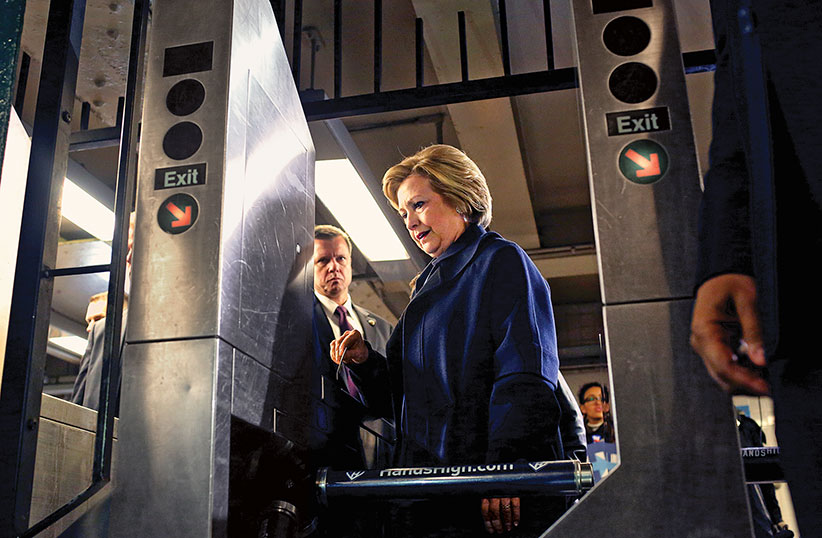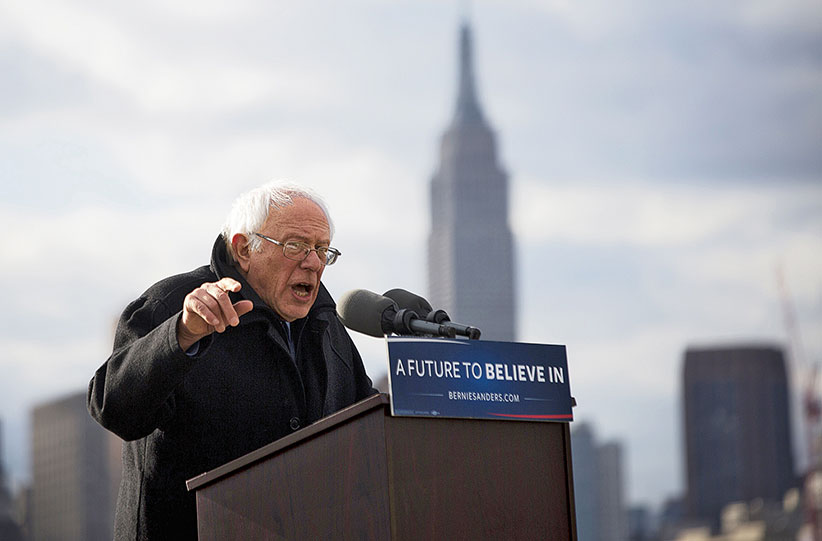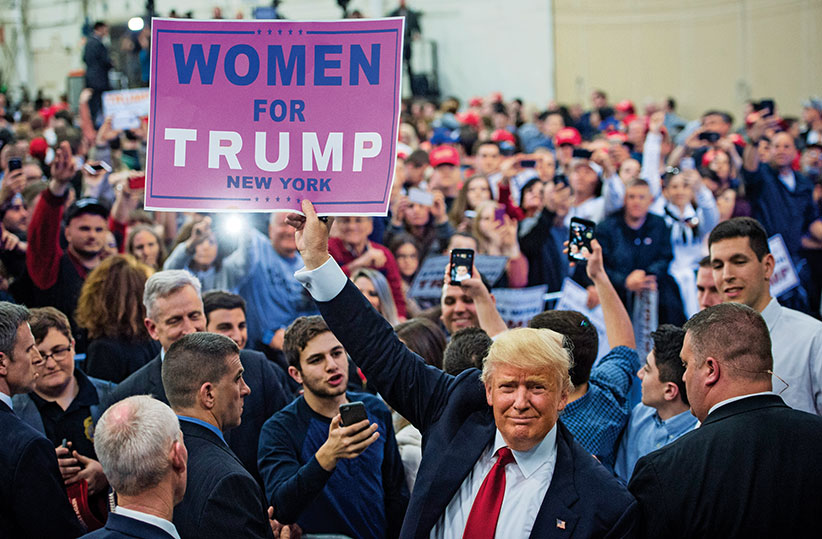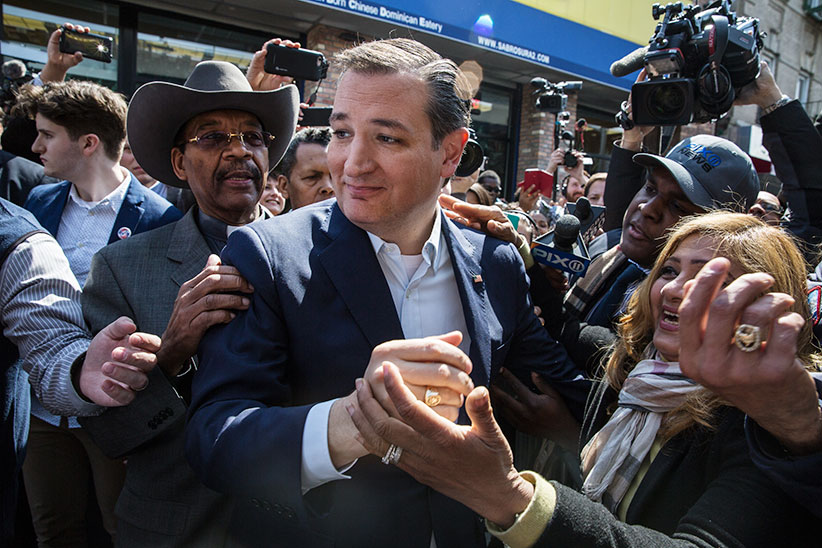New York’s make-or-break moment
With leaders on both sides claiming a hometown connection, a city historically at odds with Washington suddenly matters
Presidential candidate Hillary Clinton (D-NY) enters the 161st Street subway station in the Bronx, NY, on April 07, 2016, after campaigning with Bronx borough President Ruben Diaz Jr. near Yankee Stadium. (Yana Paskova/The Washington Post/Getty Images)
Share

The “American-born Chinese Dominican seafood eatery” called Sabrosura 2 was full of Orthodox Jews, which is pretty much New York in a clamshell. Outside, a hundred or so black and white and brown citizens and armoured cops and dishevelled TV news cameramen and beauty-queen Latina anchorwomen were jostling on the sidewalk on Westchester Avenue, and overhead the No. 6 local train was thundering toward the outer limits of the Greatest City in the World.
Then a black Suburban pulled up and Sen. Rafael “Ted” Cruz, Jr. of Calgary, Texas, got out of the passenger-side door, smirking as he always does and saying, “Hi. How are you?” People started bellowing, “God bless you, Ted!” and “Get the hell out of the Bronx!” and “We love you, Ted!” and “What the f–k are you doing in my neighbourhood?” and everybody started shoving and screaming and so you had dreadlocks, sidelocks and headlocks all at the same time and you knew that the 2016 presidential campaign finally had made it to New York, N.Y.
“God bless you, too,” said Cruz.
This wasn’t Iowa or New Hampshire or South Carolina or any of those other pipsqueak cows-and-cornstalks states. It was 10 days out from the April 19 New York primary, whose substantial haul of winner-take-most delegates (95 for the Republicans and 291 for the Democrats) will decide either everything or nothing for both the Democratic and Republican parties in the most bizarre and berserk presidential campaign since they started letting white male citizens vote down here in 1788.
Within the span of 24 hours you had:
New York native Donald Trump on Long Island, in the wilderness beyond the city line, preaching to 10,000 suburbanites about winning, winning, winning, while 1,000 protesters are yelling, “Build bridges, not walls,” and the Donald’s supporters are teasing them with chants of “Foooood stamps, foooood stamps!”
Sen. Bernie Sanders of Brooklyn, Vermont, confessing to the editorial board of the New York Daily News that he doesn’t know how to ride the subway anymore—“Jump the turnstile?”
Gov. John Kasich of Ohio hamming it up with Montel Williams at a ballroom in Bay Ridge while two handsome young actors are taunting each other across the room—“You’re a Democrat, you want everything for free!” “No! I’m undecided!”
And former Secretary of State Hillary Clinton, who represented New York in the U.S. Senate for eight years, making a big show of actually getting on the subway at Yankee Stadium—after trying five bumbling times to swipe her fare card—while some wag from the Sanders campaign is tweeting, “Unfortunately, she’ll take it directly to Goldman Sachs.”
“Sen. Clinton says that I’m not qualified to be president of the United States. Maybe she is the one who is not qualified to be president,” Sanders was snarling to a television interviewer.
“I never said Sen. Sanders is not qualified,” retorted Sen. Clinton.
“Who the hell is Bernie Sanders to say somebody is not qualified to run for president of the United States?” asked 85-year-old, 22-term Congressman Charlie Rangel of Harlem.
“New York nasty!” exulted U.S. News & World Report.
It has been 40 years since a New York presidential primary mattered so existentially to both the Democratic and the Republican candidates, and the first time in at least a century that native and adopted Gothamites were among the top contenders on both sides. Older citizens revelled in the sudden attention—or reviled the hypocrisy—remembering the famous headline in the Daily News from 1975, when president Gerald Ford refused to offer a federal bailout to the bankrupt, derelict metropolis: “Ford to city: drop dead.”

Younger voters—and even students too young to vote—were swept away by the moment. One of the protesters outside the American-born Chinese Dominican seafood eatery on Westchester Avenue was a 16-year-old student from Bronx Lighthouse College Preparatory Academy named Destiny Domeneck. Domeneck was wearing buttons that said “America needs socialism” and “Smash the patriarchy” and carrying a handmade sign that said “Ted Cruz, here’s your wall.” This was an allusion to a remark that the pious Southern Baptist had made a few months earlier, suggesting that Manhattanites might profit from a twin of Donald Trump’s proposed barricade of the Rio Grande to staunch the flow of Latinos crossing the Harlem River from the Bronx.
Cruz originally was scheduled to visit Lighthouse Prep, but Domeneck and a number of other students told their principal that they’d lead a walkout if he did. So the venue was changed to the café.
(Cruz also has proposed placing “armed patrols in Muslim communities,” which would have to include Westchester Avenue, where Sabrosura 2’s neighbours include Banglatown Halal Meats and the Mi Casa Su Casa Hookah Lounge.)
“It’s a bittersweet moment,” Domeneck told Maclean’s. “It’s great to see the candidates come to New York, but it’s not right to say that Manhattan should be scared of the Bronx, because people are so closed-minded. They hear, ‘Oh, somebody got shot in the Bronx,’ or ‘Police brutality in the Bronx,’ and they think that the Bronx is as bad as it used to be, but the Bronx is really improving.”
Ted Cruz walked into the American-born Chinese Dominican seafood eatery, and a man in a brown hoodie started screaming: “This is an immigrant community! To see this right-wing bigot is an insult to the whole community!”
One of the Orthodox Jews already inside, but not eating—the food wasn’t kosher—was a man named Ariel Kohane, who said he admired Cruz for his unwavering support for Israel and for having “a moral compass.” “I think Cruz is right when he criticizes ‘New York values,’” Kohane said. “New Yorkers don’t have values. We are not polite for the most part. We are not the friendliest people.”

Cruz launched into his standard speech about how his father had fled Cuba to the United States with $100 hidden briefly in his underpants and laboured to explain that what he really means when he expresses his revulsion for “New York values” are the sort of odious liberal-Democrat principles that include marriage equality for same-sex couples and the embrace of immigrants, be they documented or not.
“There’s nothing wrong with New York,” said a businessman named Rafael Flores, originally from El Salvador. “Everybody wants to be here. The only people who don’t care about New York are the politicians. All they want is money from Wall Street.”
State Sen. Rubén Díaz, Sr., was the one who had invited Cruz to the polyglot barrio. (Díaz, an evangelical pastor born in Puerto Rico, is a conservative Republican. His son, Rubén Díaz, Jr., the borough president of the Bronx, is a liberal Democrat.) “We black and Latino people don’t get nothing from the Republicans because they know we won’t vote for them anyway, and we don’t get nothing from the Democrats because they know we will vote for them anyway,” Díaz, Sr., told Maclean’s. “We have been used, abused and neglected. Nobody cares about the minority community. Nobody cares about New York. They never do.”
“Honey, how do we get out of the Bronx?” asked the Daily News above a photo of Cruz’s wife Heidi. “Take the F U train, Ted,” the headline below advised. (It was “Ford to city” reversed.)
Then Cruz, who was 34 percentage points behind Trump in the latest New York state opinion poll (yet who still was hoping to snatch a delegate or two from the frontrunner under the state’s excruciatingly complex apportionment formula), got back in the Suburban and headed to a matzo factory in Brooklyn and prayed the whole Bronx thing would pass over.
The next evening, the Bay Ridge Manor banquet hall in the Italian-Swedish-Mexican-hipster neighbourhood in Brooklyn—just around the corner from the Chinese halal sushi restaurant and the Korean grocery with the Egyptian flag out front and the posters advertising the Greek Independence Day parade—was full of Orthodox Jews.
Montel Williams, the TV infomercialist and ex-marine, was about to introduce Gov. John Kasich of Ohio—one of the three Republican candidates still standing out of the original 17—when two young men on opposite sides of the Italian-style marble-and-crystal wedding-reception salon stood up and started screaming imprecations at each other, the most vile of which was “You’re a Democrat!”
This was either real life or theatrical histrionics, which in New York City is pretty much the same thing.
A man named Richard Resnick was in the audience, wearing one of those red Donald Trump ball caps with the words “Make America great again.” “What would Kasich have to say to make you take off that hat and vote for him?” Maclean’s asked Resnick.
“He’d have to say, ‘Build that wall!’” Resnick replied. “But when you say that, people think you’re a hater.”

The man in the cap said that he was certain that, even if the Donald wins New York on April 19, he will not amass enough committed delegates to win the nomination on the first ballot at the Republican convention in Cleveland in July. If that happens, said Resnick, he will consider supporting Kasich, the mailman’s son and coal miner’s grandson who has been banking—and draining his backers’ bank accounts—on the same scenario.
Now the shouting young poseurs were urged outside, and Williams introduced Kasich as a man of reasonableness and competence. The Ohio governor launched into his standard speech about his working-class origins and how he had been ignored during all those madcap, Trumped-up debates—“I was like a potted plant”—and about his own deep, but unadvertised, religious convictions: “I’m a God guy.”
“We’re gonna fix this country,” Kasich prophesied. “We. Us. Not all of it. Just fix the part you can, and you’ll get in the Book of Life. You’ll get in the good part, with a nice view of the golf course and the lakes.”
Like Resnick in the red ball cap, Kasich said he was hoping for a contested convention that would turn pleadingly to him because “who could actually win in the fall is gonna, like, be a consideration.” But he was afraid that “we’ll pick Trump because he’s not a politician and he’ll spend the first hundred days trying to find the bathroom.”
The next afternoon, Sanders was going to return for a rally outside his natal domicile at East 26th Street and Kings Highway in Brooklyn. Kings Highway was the road that the British Army marched along on its way to decimate George Washington’s insurgents in the Battle of Brooklyn in 1776.
East 26th Street—wait for it—was full of Orthodox Jews. They lived there. The entire street of handsome, million-dollar houses was a distinctive quartier of little boys in yarmulkes playing ball hockey and red-haired girls scootering and mothers rushing to finish preparing Sabbath dinner before the setting of the sun.
Bernard Sanders, the son of a Jewish immigrant paint salesman, had grown up, 60-plus years earlier, not in what Brooklynites call a “single-family house,” but in apartment 2C of a six-storey, yellow-brick pile on the corner. Now at least 1,000 people, most of them well under 30, patiently were queuing to hear him speak.
This displeased the residents of the single-family homes; most of these people were, they said, committed Jews for Cruz. Some had been at the matzo factory with him the day before. Some hailed his unwavering support for the state of Israel. One—a woman named Annie Beinhorn—opened her overcoat to reveal a T-shirt that said “Reagan Bush ’84.”
“Just because Bernie’s from East 26th Street doesn’t make him good for East 26th Street,” said Beinhorn, who holds a master’s degree in political campaign management from New York University. “Just because he’s Jewish doesn’t make him good for the country.”
“Donald Trump is Republicans not knowing how to channel their anger,” she said. She swallowed hard and admitted that, if Trump gets the Republican nomination, she will vote for (ugh) Hillary Clinton.
A few front yards away, Sanders launched into his standard speech about the corruption of the campaign finance system and tuition-free public university education and how one-10th of one per cent of American families possess more wealth than the bottom 90 per cent combined.
A reporter from All-News WINS Radio 1010 came over and asked Beinhorn how she felt about living on the block where a potential president grew up. It was April, and the campaign finally had made it to New York with all its energy and its passion and its wonderful, mongrel, meshuga population. The Orthodox Jew leaned into the microphone and said, “I think we’re screwed either way.”